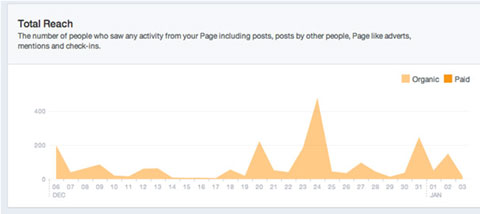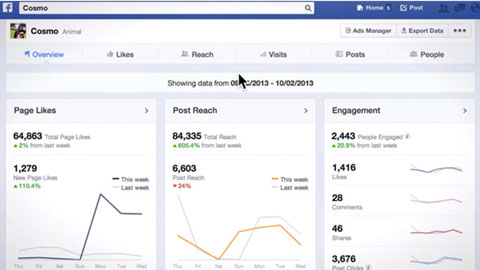
(Attribution: Photo: Harland Quarrington/MOD)
Organic reach is the number of people who see your page's post in their news feed or on your page, and includes people who see a friend like, comment or share your post.

Organic reach for Facebook pages has reportedly dropped significantly in the last month, according to some businesses using the social networking platform.
click to enlargeSome time around the beginning of December, Facebook changed its algorithm in such a way that every user's news feed was tweaked slightly - more relevant, newsy-type stories and shared articles by friends would be seen, but at the expense of posts by pages. Many businesses, including small-to-medium-sized businesses that can't really afford huge marketing budgets, saw the potential of social media marketing some years back and have built up healthy followings and a good number of likes on their Facebook pages. However, this recent move by Facebook is an attempt to get companies to pay to reach these audiences. And that's bound to make some of them unhappy.

The latest layout of Facebook's insights page, where pages can track their reach.
click to enlarge"We expect organic distribution of an individual page's posts to gradually decline over time as we continually work to make sure people have a meaningful experience on the site. We're getting to a place where because more people are sharing more things, the best way to get your stuff seen if you're a business is to pay for it," says a document produced by Facebook.
The message is clear. Facebook is killing off organic reach for pages. Whether you've paid money for adverts that attracted people to like your page, or the pages have grown organically thanks to good quality content, it will now be harder than ever to reach the audience your page has built up.
This pay-for-play is par for the course, says Brenda Arndt, a website marketing manager quoted by Mashable: "The idea of organic reach dropping a little bit, we always knew that we'd actually end up advertising on Facebook to reach more people than what we could in organic anyways. So it's not necessarily overly surprising that that's what we're going to have to do.
"I think that we're definitely comfortable with the fact that we're going to have to advertise to get some reach. I've never felt like Facebook is a free tool to reach our customers."
Adapt or...
With posts competing with ever more content on Facebook users' news feeds, adapting to the change is the only thing social media marketers can do (and that's a good approach to take with Google's regular algorithm changes, too). This could mean a few things:
• Companies that don't want to abandon their audience on Facebook should be prepared to find some money in their marketing budget to start spending on Facebook. Paid posts may soon be the only way to get through to your customers
• If you want to persevere with organic reach, make sure all your content is truly interesting and unique. It will still get shared around and enjoy a decent reach, but perhaps not to the same extent as before - so really make it count

• There's a great comment from Adam Rosenberg on this story. He says: "The other option here - if you don't do paid - is to focus on a strong ambassador or advocacy program. Your friends' content cuts through news feed. Facebook knows this. If you create strong programs where your fans are actively sharing your content on your behalf, you can combat this."
• Never put all your eggs in one social media basket. Start spending more time cultivating followings elsewhere, and see how they do. Platforms like Google Plus and Instagram have seen some success, but there are plenty more to suit your company
• Don't take any of this advice as gospel. With Facebook constantly tweaking its platform, this advice might be out of date within a few months. Keep yourself informed and up to date
More changes to come
Facebook's announcement about its algorithm changes comes at about the same time that Gmail decided to cache all images contained in users' incoming mail on its own servers. While this means images will load faster for users, it also affects those who use mailers and newsletters for marketing, as fewer stats will be sent back from the user's inbox. This makes tracking the open rate and click-through rate very difficult (this article explains it well), and clients should expect to see a drop in those numbers. This, however, doesn't mean that less people are reading your newsletter, but rather that Gmail is no longer sending accurate data back about open rate and click-through rate.
The online space is an ever-changing one, and companies that don't stay current will lose out. Those that get comfortable relying on tried-and-tested marketing methods will see a fall in numbers if they don't stay on their toes. With more people and more businesses online, having "good content" is one thing - but there's a lot more good content out there with which we now have to compete. The trick is to get yours seen. The more attention (and let's be frank, money) a company can direct towards cultivating its online presence, the better chance it has of reaching the right people.




















































